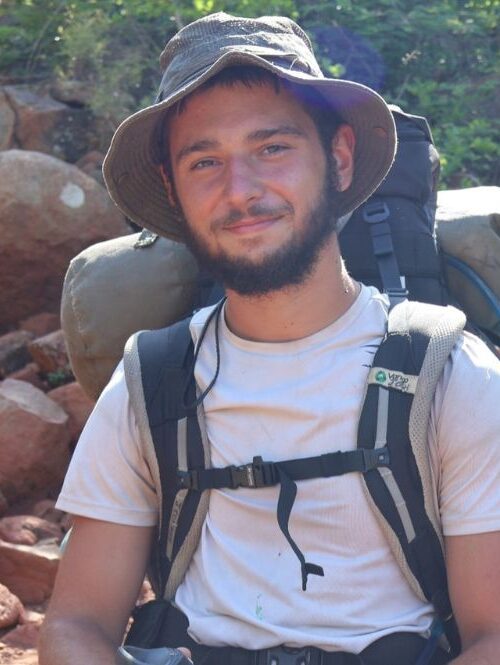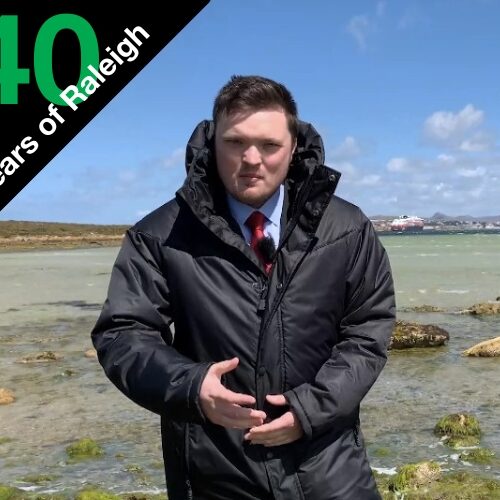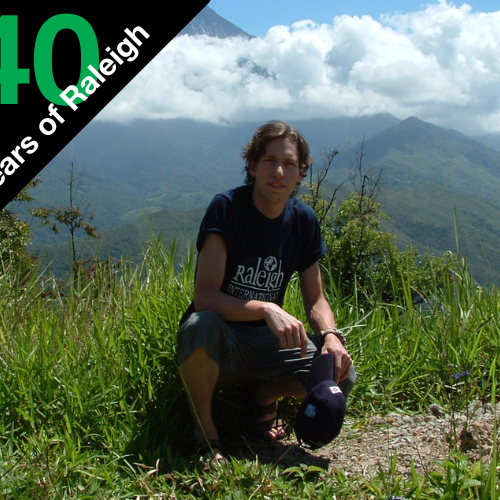Lindsey's First Trek in Costa Rica With Raleigh International
Home | Costa Rica |
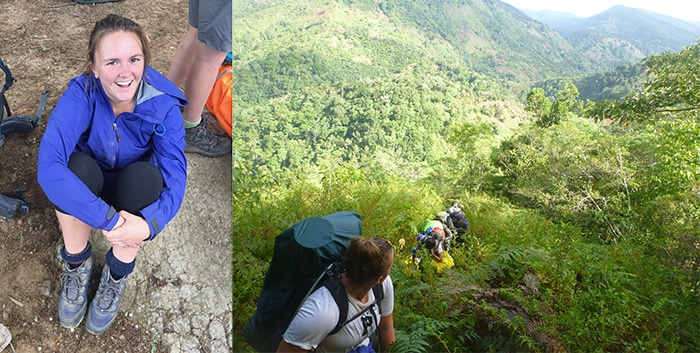
“After college, I’m hoping to apply for a fellowship in Latin America. I love the culture, so I’ve always wanted to go. Volunteering with Raleigh seemed like the perfect opportunity to help me decide whether I do want to go for the fellowship and being able to practice my Spanish was a huge plus. I did not know I’d be practicing this much, so that was a really nice surprise!”
“Después de la universidad, espero solicitar una beca en América Latina. Amo la cultura, así que siempre quise ir. Ser voluntario con Raleigh me pareció la oportunidad perfecta para ayudarme a decidir si quería ir a la beca y si podía practicar mi español era una gran ventaja. No sabía que estaría practicando tanto, ¡así que fue una gran sorpresa!”
In the States, most students will complete an internship in the summer between their junior and senior year. Lindsey had started to apply for internships but was struggling to find anything she was really passionate about.
“I was talking to a friend of mine from New Zealand about it and saying how I didn’t feel like I had a purpose or direction. She said she had done Raleigh before going to University and that it completely changed her perspective on things and recommended that I should apply.”
En los Estados Unidos, la mayoría de los estudiantes completarán una pasantía en el verano entre su penúltimo y su último año. Lindsey había comenzado a solicitar pasantías, pero estaba luchando por encontrar algo que realmente le apasionara.
“Estaba hablando con un amigo mío de Nueva Zelanda sobre eso y diciendo que no sentía que tuviera un propósito o una dirección. Ella dijo que había hecho Raleigh antes de ir a la Universidad y que cambió por completo su perspectiva sobre las cosas y me recomendó que debería presentar mi solicitud.”
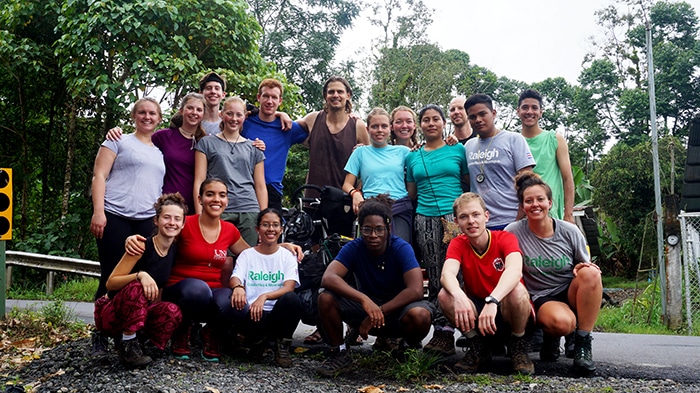
On Lindsey’s first phase on expedition, she completed the 280km Baricífico Trek, hiking almost from one side of the country to the other. The trek is an opportunity for volunteers to challenge themselves, both mentally and physically, and develop valuable leadership and teamwork skills that stay with them well beyond their time on expedition.
“Trek was probably one of the hardest things I’ve done in my life. It was really challenging to stay motivated the whole time, but I learned a lot about myself.”
En la primera fase de la expedición de Lindsey, completó la caminata de 280 km Baricífico, yendo de un lado al otro del país. El viaje es una oportunidad para que los voluntarios se desafíen a sí mismos, tanto mental como físicamente, y desarrollen habilidades valiosas de liderazgo y trabajo en equipo que permanezcan con ellos mucho más allá de su tiempo de expedición.
“Trek fue probablemente una de las cosas más difíciles que he hecho en mi vida. Fue realmente un reto mantenerme motivado todo el tiempo, pero aprendí mucho sobre mí.”
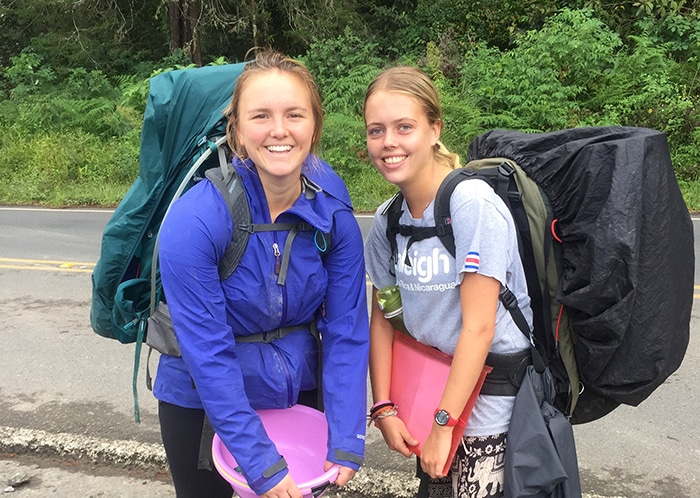
On Raleigh expeditions in Costa Rica, international volunteers work alongside home country volunteers, whose native language is Spanish. Throughout expedition, it is essential that all our volunteers can be involved in all aspects of our projects. Therefore, translation of all communications is a key and provides volunteers to learn and practice their English and Spanish.
“Although I was a day leader on trek, I preferred the day when I was deputy leader. The day leader was a Spanish speaker, so I ended up getting to lead with someone else and practice my Spanish. It also meant I got to be a motivator on a particularly tough day when we were summiting a mountain. Everyone was exhausted, it was a lot longer than we had thought and it was starting to rain so everyone wanted to keep giving up but we kept motivating everyone ended up pushing the group to the top. It was a perfect moment and really rewarding to achieve that as deputy leader.”
En las expediciones de Raleigh en Costa Rica, los voluntarios internacionales trabajan junto a los voluntarios del país de origen, cuyo idioma materno es el español. Durante toda la expedición, es esencial que todos nuestros voluntarios puedan participar en todos los aspectos de nuestros proyectos. Por lo tanto, la traducción de todas las comunicaciones es una clave y proporciona voluntarios para aprender y practicar su inglés y español.
“Aunque era un líder en la caminata, prefería el día en que fui encargada. El líder del día era hispanohablante, así que terminé liderando con otra persona y practiqué mi español. También significaba que tenía que ser un motivador en un día particularmente difícil cuando estábamos en la cumbre de una montaña. Todo el mundo estaba exhausto, fue mucho más tiempo del que habíamos pensado y estaba empezando a llover, así que todos querían darse por vencidos, pero seguimos motivando a todos y terminamos empujando al grupo a la cima. Fue un momento perfecto y muy gratificante para lograr eso como líder de semana”.
Following trek, Lindsey’s group travelled to the Sharabata Community in the Alto Chirripó Indigenous Territory. Here, our volunteers are living and working alongside members of the local community to help build a secondary school.
“Volunteering on the community project is such a contrast to our first phase, the way of life is much calmer and relaxed and it has helped me unwind after trek. The indigenous community is beautiful and very remote. The people here were initially quite shy but we have started to get to know them and they are really friendly.”
Después de la caminata, el grupo de Lindsey viajó a la comunidad de Sharabata en el territorio indígena Alto Chirripó. Aquí, nuestros voluntarios viven y trabajan junto a miembros de la comunidad local para ayudar a construir una escuela secundaria.
“El voluntariado en el proyecto comunitario es un gran contraste con nuestra primera fase, el estilo de vida es mucho más tranquilo y relajado y me ha ayudado a relajarme después de la caminata. La comunidad indígena es hermosa y muy remota. La gente aquí fue inicialmente bastante tímida, pero hemos empezado a conocerlos y son muy amables.”
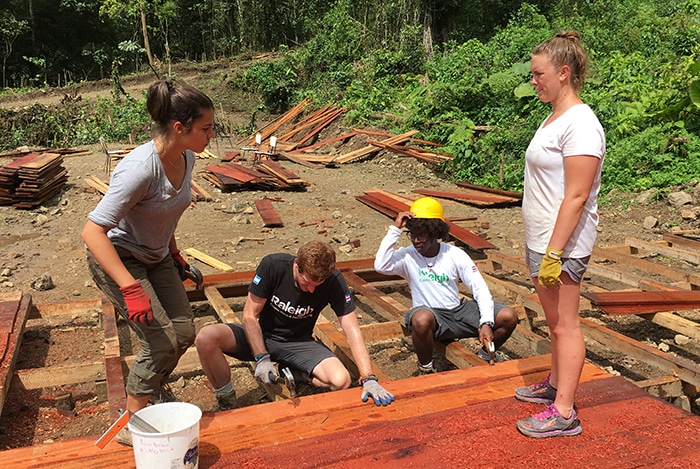
When speaking to Lindsey, volunteers had helped build three classrooms and members of the indigenous community had already started using the new space. Lessons were being held whilst the volunteers carried on working to complete two further classrooms.
“It is amazing to see them already using the classrooms that have already been built and see how it is directly making an impact on the children in the community. The children come out at 6:30am and stay until 1pm and are quite clearly trying to get an education.”
Al hablar con Lindsey, los voluntarios habían ayudado a construir tres aulas y los miembros de la comunidad indígena ya habían comenzado a usar el nuevo espacio. Las lecciones se llevaron a cabo mientras los voluntarios continuaron trabajando para completar dos aulas adicionales.
“Es increíble ver que ya usan las aulas que ya se han construido y ven cómo está impactando directamente a los niños de la comunidad. Los niños salen a las 6:30 a.m. y se quedan hasta la 1 p.m. y claramente están tratando de obtener una educación.”
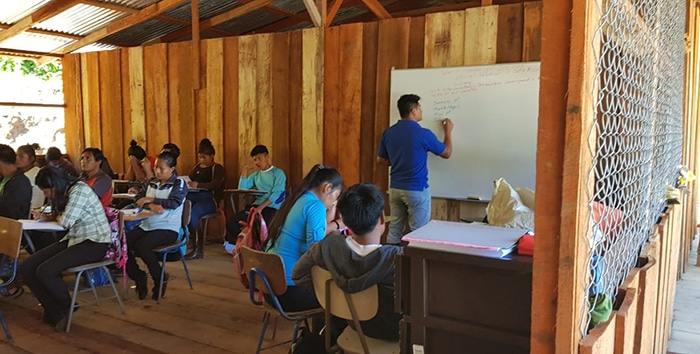
Children living in indigenous areas have some of the lowest levels of school attendance in Costa Rica and some of the highest rates of illiteracy. On average, only 9.1% of children living in indigenous territories go on to attend secondary school.
“One of the most shocking things to me was hearing that most indigenous communities have an average of 3-4 years of education. The children here are clearly trying to beat that average, so it is really cool that we can help make an impact here and witness it in action. By seeing the direct impact we can have, it pushes us to work harder.”
Los niños que viven en áreas indígenas tienen algunos de los niveles más bajos de asistencia escolar en Costa Rica y algunas de las tasas más altas de analfabetismo. En promedio, solo el 9.1% de los niños que viven en territorios indígenas van a asistir a la escuela secundaria.
“Una de las cosas más impactantes para mí fue escuchar que la mayoría de las comunidades indígenas tienen un promedio de 3-4 años de educación. Los niños aquí claramente están tratando de superar ese promedio, por lo que es genial que podamos ayudar a hacer un impacto aquí y atestiguarlo en acción. Al ver el impacto directo que podemos tener, nos empuja a trabajar más duro.”
Raleigh’s volunteer teams are made up of young people from a wide range of backgrounds and nationalities. This way, young people can share their cultures and differing perspectives.
“It has been a really great learning experience for me as it has shown me how to become more flexible and understanding of people’s different perspectives on things. Before I came in with one mindset, but now I’m open to understanding more and taking a step in other people’s shoes.”
Los equipos de voluntarios de Raleigh están formados por jóvenes de una amplia gama de orígenes y nacionalidades. De esta manera, los jóvenes pueden compartir sus culturas y perspectivas diferentes.
“Ha sido una gran experiencia de aprendizaje para mí, ya que me ha mostrado cómo ser más flexible y entender las diferentes perspectivas de las personas sobre las cosas. Antes de venir con una mentalidad, pero ahora estoy abierto a comprender más y dar un paso en los zapatos de otras personas.”
When asked whether her experience with Raleigh has helped her decide her plans for the future, Lindsey replied: “Just being in these communities and seeing how lovely people in Latin America are, especially in Costa Rica, it has definitely reaffirmed my desire to come down here and apply for the fellowship. I’m very excited for the opportunity that I might work here and be here for longer.”
“Cuando le preguntaron si su experiencia con Raleigh la ayudó a decidir sus planes para el futuro, Lindsey respondió: “Solo al estar en estas comunidades y ver cuán amables son las personas en América Latina, especialmente en Costa Rica, definitivamente ha reafirmado mi deseo de venir aquí y solicitar la beca. Estoy muy emocionada por la oportunidad de que pueda trabajar y estar aquí por más tiempo.”
Interview and words by Communications Officer Helen Kidwell
